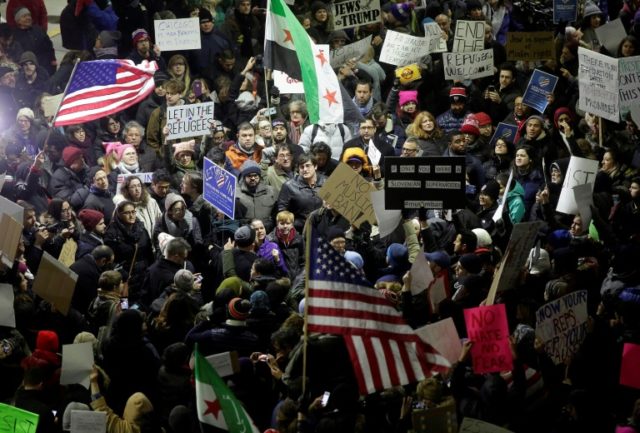New York (AFP) – The United States braced Sunday for a second day of furious protests against Donald Trump’s ban on travelers from seven Muslim countries as the White House doubled down despite a partial stay from a federal judge.
Protests were scheduled outside the White House and in New York’s Battery Park, which looks across to the Statue of Liberty — America’s famed beacon of freedom and immigration — and expected at airports nationwide.
Trump signed the temporary ban as an executive order on Friday afternoon, suspending the arrival of all refugees for at least 120 days and barring visa holders from Iran, Iraq, Libya, Somalia, Sudan, Syria and Yemen.
Also affected were foreign dual nationals, who may not have needed a visa to enter the United States, for example British citizens, and at least initially green card holders already on the path to US citizenship.
The inclusion of green card holders sparked particular outrage, leading White House chief of staff Reince Priebus to backpedal Sunday, telling CBS television that the ban “didn’t affect them.”
Nevertheless they are still liable to face “extreme vetting” at US borders upon arrival.
The travel ban triggered shock and confusion, as well as a wave of anger at home and abroad, sparking demonstrations Saturday at airports in Washington, Chicago, Minneapolis, Denver, Los Angeles, San Francisco and Dallas.
Travelers were detained at US borders, splitting families — such as a father unable to reach his son’s wedding, and a grandmother unable to meet her grandchildren — and officials warned it was a “gift to extremists.”
On Saturday night, a federal judge in New York partially blocked the order, saying that US authorities could not to deport refugees or other people detained on arrival.
But Trump — the New York real estate billionaire turned Republican commander-in-chief — was unrepentant Sunday, defending his policy in the face of growing outrage across the globe and from Americans at home.
“Our country needs strong borders and extreme vetting, NOW. Look what is happening all over Europe and, indeed, the world – a horrible mess!” he tweeted to his nearly 23 million followers.
– Bannon promoted –
The Department of Homeland Security said it would comply with court orders not to deport those already detained, but said it would otherwise continue to enforce the order.
“Prohibited travel will remain prohibited, and the US government retains its right to revoke visas at any time if required for national security or public safety,” it said in a statement.
Trump fanned further disquiet by giving controversial adviser Steve Bannon, a founding member of far-right website Breitbart News, a permanent seat on the National Security Council at the expense of other security chiefs.
While Bannon was promoted, the Director of National Intelligence and chairman of the Joint Chiefs of Staff will now be present only when “their responsibilities and expertise” are required, said an executive memorandum.
The exact number of those affected by the travel ban is unclear, but Judge Ann Donnelly ordered the government to provide lists of all those detained at US airports since the measure went into effect.
She issued the emergency stay late Saturday night but did not broach the constitutionality of Trump’s order to the anger of protestors at New York’s John F. Kennedy Airport, where thousands had gathered.
“People are prepared to stand against this” said David Gaddis, 43. “Every day he’s in office, it’s a national emergency.”
Deporting those travelers following Trump’s order exposes them to “substantial and irreparable injury,” Donnelly wrote in her decision.
The American Civil Liberties Union went to court after two Iraqi men, one of whom had worked as an interpreter for the US military after the 2003 US-led invasion, were detained on arrival at JFK.
– Overseas outrage –
A second federal judge in Virginia issued a temporary order restricting authorities for seven days from deporting legal permanent residents detained at Dulles Airport just outside Washington.
The order follows through on one of his most controversial campaign promises, to subject travelers from Muslim-majority countries to “extreme vetting” — which he declared would make America safe from “radical Islamic terrorists.”
The State Department has said that only people holding a dual citizenship with the US will be allowed to enter.
The plan triggered a fierce political backlash, but was endorsed by Republican Speaker of the House Paul Ryan.
Democratic lawmakers have also been up in arms, seeing the ban as an opportunity to galvanize outrage to the new president.
“This is not who we are,” wrote former Democratic presidential candidate Hillary Clinton on Twitter.
German Chancellor Angela Merkel slammed the restrictions, saying it was “not justified” to target people based on their background or religion and a spokesman said Berlin will examine the consequences for German citizens.
British Prime Minister Theresa May, who met Trump in Washington on a charm offensive last week, said she did “not agree” with the restrictions.
British athletics legend Mo Farah, who was born in Somalia, called it a policy of “ignorance and prejudice” that could keep him apart from his family, based in Oregon, while he is currently training in Ethiopia.
And in Iraq, a key partner in the war against jihadists for more than two years, there were calls for a reciprocal ban on US citizens.

COMMENTS
Please let us know if you're having issues with commenting.